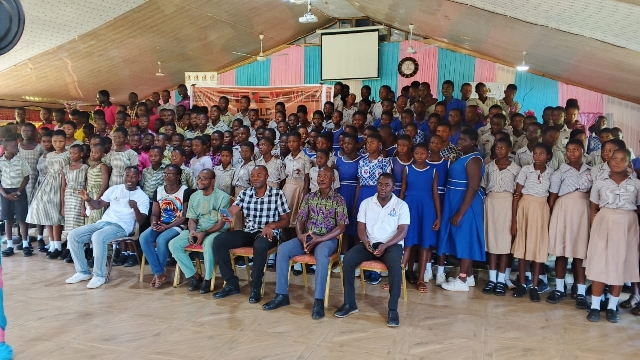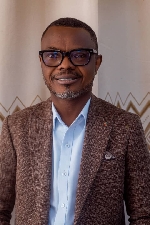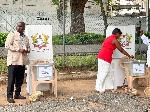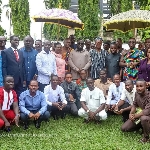ZiSFoD Foundation, Ada West NCCE empowers students on World Environment Day
 Members of the NGO and NCCE in a group photograpgh with the school children
Members of the NGO and NCCE in a group photograpgh with the school children
As part of measures to restore and protect our ecosystems and to foster a sense of responsibility, Zion Seed Foundation for Development (ZiSFoD), in collaboration with the Ada West District office of the National Commission for Civic Education (NCCE), has educated and sensitized students in the Ada West District to raise awareness on sustainable change and building a resilient future through eco-solutions.
The event, held in commemoration of World Environment Day 2025, aims to instil environmental awareness in children and promote environmental sustainability.
World Environment Day is celebrated annually on June 5th, a global platform for raising awareness and fostering action to protect our environment.
This year's celebration was centred on the theme: “Ending Plastic Pollution,” highlighting the urgent need to combat plastic waste and safeguard the planet.
ZiSFoD, known for its work in promoting sustainability across communities and schools, focuses on climate change, energy efficiency, and conservation education.
The foundation’s vision is to empower students to drive environmental change through eco-literacy and school-led initiatives.
Under its “Catch Them Young” approach, ZiSFoD encourages student-led environmental and Water, Sanitation, and Hygiene (WASH) solutions, dubbed ‘ECO-SOLUTIONS,’ alongside reading programmes like ‘TEC.READ.’
Addressing the gathering, which was mainly students from selected schools in Sege, the Executive Director of ZiSFoD, Dr. Jones Frimpong, urged students to take action against plastic pollution.
“You, our students, and young leaders have the power to turn the tide. By making small but powerful choices, you can help protect our planet and lead the way toward a cleaner, greener future,” he said.
He outlined practical steps students can take to become Plastic Heroes by reducing plastic use by refusing straws and single-use bottles, reusing containers creatively, and recycling waste into new products.
Dr. Frimpong emphasised the importance of waste segregation and composting organic materials. “Every time you choose to reduce, reuse, or recycle, you help keep plastics out of the ocean,” he noted, warning that without action, there could be more plastic than fish in the sea by 2050.
He disclosed that the global plastic pollution crisis continues to escalate, with alarming statistics shedding light on the scale and urgency of the problem.
Dr. Frimpong revealed that according to the United Nations Environment Programme (UNEP) 2023 report, more than 430 million tonnes of plastic are produced worldwide each year, adding that nearly two-thirds of this becomes waste after just a single use.
He pointed out that despite growing awareness and efforts to combat plastic pollution, only 9% of all plastic waste ever produced has been recycled, while 12% has been incinerated, leaving a staggering 79% to accumulate in landfills, dumps, or the natural environment, according to the OECD 2022 report.
Dr. Frimpong reiterated that in Ghana, the situation is similarly dire, saying that the country generates approximately 1.1 million tonnes of plastic waste annually, yet only 5% of this is recycled, noting that this low recycling rate contributes significantly to environmental degradation, especially in coastal areas.
He further stated that 250,000 tonnes of plastic waste enter the ocean each year from Ghana alone.
These pollutions pose severe threats to marine ecosystems, biodiversity, and the livelihoods of communities dependent on fishing and tourism.
Dr. Frimpong noted that the problem is particularly acute in the Greater Accra Region, which produces over 300 tonnes of plastic waste daily, adding that with insufficient infrastructure for waste management and recycling, much of this plastic ends up clogging drains, littering communities, and polluting water bodies.
He called for collective action, urging students to champion environmental stewardship.
“Let us raise a generation of Plastic Heroes children and youth who are informed, responsible, and committed to protecting our planet,” Dr. Frimpong stated.
He said that through education and sustainable practices, the initiative aims to foster a cleaner, greener, and more sustainable Ghana.
Dr. Frimpong, therefore, called for urgent and coordinated action to curb plastic pollution and suggested interventions, including promoting sustainable packaging, strengthening recycling systems, enforcing waste management laws, and raising public awareness.
The Ada West District Director of the National Commission for Civic Education (NCCE), Samuel Etsey, called for urgent action against the growing menace of plastic pollution, urging young people to play an active role in protecting the environment.
He described plastic pollution as a critical issue threatening the environment and the future of the next generation and warned that if left unchecked, plastic pollution is projected to triple by 2040, posing serious risks to both ecosystems and human health.
Mr. Etsey emphasised the crucial role school children and young people can play in tackling this crisis, noting that school children, with their natural curiosity and creativity, are well-positioned to come up with innovative solutions.
He added that since young people will inherit the consequences of today's environmental choices, it is essential for them to understand the importance of conservation and sustainability.
Mr. Etsey encouraged the students and families to adopt the principles of "Reduce, Reuse, Recycle," recommending using reusable bags and water bottles, avoiding single-use plastics like straws and cutlery, and participating in school recycling programmes.
He also advocated for transforming plastic waste into useful items, such as turning plastic bottles into flower pots or beds for clinics, as a creative way to reduce waste.
He further called for organising school programmes, community events, and hands-on workshops to raise awareness and build skills in plastic waste segregation and recycling, adding that partnering with schools would help instil sustainable practices in children and reduce plastic waste across communities.
Mr. Etsey urged citizens to participate in local clean-up campaigns, reduce plastic use, and promote recycling and stressed that by working together, sharing knowledge with friends and family, and engaging in sustainability initiatives, Ghanaians can build a cleaner, healthier, plastic-free future.
Source: Classfmonline.com
Trending News

Lawyer slams Ghana, ECOWAS over silence on Togo’s constitutional crisis
12:38
Ghanaian extradited to U.S. over multi-million dollar romance scam
06:58
Asantehene meets Kusang Traditional Council in push for lasting peace in Bawku
12:31
TEWU-GH declares indefinite nationwide strike over union representation dispute
12:23
Volta GWCL boss outlines achievements and urges sustained commitment amid transition
00:11
GJA goes to the polls today
13:34
Communications Minister assures press freedom as anti-misinformation Bill heads to Parliament
11:54
Fafa Radio CEO calls for unity and support for new GJA leadership
23:55
E/R: Atiwa West DCE leads reclamation drive to combat dangers of abandoned mining pits
09:40
Ashanti Regional Lands Commission board inaugurated to enhance land governance
11:38



